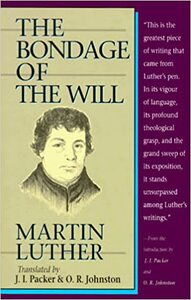Take a photo of a barcode or cover
Very smooth translation with British spelling. Preface is lacking in Lutheran understanding; leans Calvinist.
This is like listening to a reformed theological version of the Kat Williams interview. Luther holds nothing back and says exactly what he knows. As Doug Wilson put it, something like “there are bits and pieces of Erasmus flying everywhere from every page.” This is Luther nowhere near his zestiest, but it is him at some of his best work.
I would actually give it 4.5 stars.
Luther wrote this book as a response to a book Erasmus wrote on free will, attacking Luther's position. It is basically the hinge on which reformed theology swings. According to the writers of the introduction (J.I. Packer and O.R. Johnston) it is Luther's magnum opus. In this book he clearly sets out the doctrines of man's total depravity in sin and God's sovereign election. Luther rends Erasmus to pieces and does it with a fair amount of snark. Employing snark is a talent I always admire. It's a great book. If you like reformed theology, you would love it. If you don't like the doctrine of predestination, you would hate it. It is a little repetitive, making it somewhat unwieldy in places.
Luther wrote this book as a response to a book Erasmus wrote on free will, attacking Luther's position. It is basically the hinge on which reformed theology swings. According to the writers of the introduction (J.I. Packer and O.R. Johnston) it is Luther's magnum opus. In this book he clearly sets out the doctrines of man's total depravity in sin and God's sovereign election. Luther rends Erasmus to pieces and does it with a fair amount of snark. Employing snark is a talent I always admire. It's a great book. If you like reformed theology, you would love it. If you don't like the doctrine of predestination, you would hate it. It is a little repetitive, making it somewhat unwieldy in places.
Phew... To use Luther's own words: Reading through this book has shown me how "sleepy-headed" I am. This is excellent but dense. Definitely a slow and difficult read.
According to himself, Martin Luther hates free will and loves dogmatic assertions. It's hard to count how many contradictions are contained herein. He's also an arrogant dick and primarily argues through ad hominem and no true scotsman. Later in life he went on to call for the extermination of "heretics" such as the Jews, Catholics, and Anabaptists. It's no surprise that Hitler was such a huge fan of Luther.
It's always fun to return to the classics. Luther's book on the captive will is a tour de force of Lutheran theology. It deals with all the topics of theology that our Formula of Concord lays out as central, original sin, "free will", good works, the law and gospel, the work of Christ. The logic is unparalleled, the humor is a delight, and the comfort is without equal. It is an absolute must for anyone who wants to claim the title "Lutheran". All our theology is summed up in this little book.
Honestly I’m not sure how to review this book. It took me a while to get through and I can definitely say I don’t agree with Erasmus, but I can’t bring myself to 100% agree with Luther’s side of things either. But I can 100% say that I am glad neither are alive to use Twitter.
Ultimately What it comes down to is one’s faith in God and recognition that the Bible is the word of God. I think Luther would make any English teacher proud with how much he was able to pull from Scripture, and he makes me proud as a fellow Christian seeing how he relies so heavily and so resolutely on the Word. That being said, though, he was very repetitive.
Overall, not a bad read, but I can’t bring myself to give it more than 3 stars.
Ultimately What it comes down to is one’s faith in God and recognition that the Bible is the word of God. I think Luther would make any English teacher proud with how much he was able to pull from Scripture, and he makes me proud as a fellow Christian seeing how he relies so heavily and so resolutely on the Word. That being said, though, he was very repetitive.
Overall, not a bad read, but I can’t bring myself to give it more than 3 stars.
This isn’t a light or easy read, but it’s a good and classic read. The best past is Luther's main argument: that human will is bound and captive to sin and that we are unable to experience salvation apart from God's grace made manifest in the death of Jesus on the cross. I found Luther's view compelling and what he argues here even more compelling. I did feel like I was reading a Facebook theology debate at times lol.


